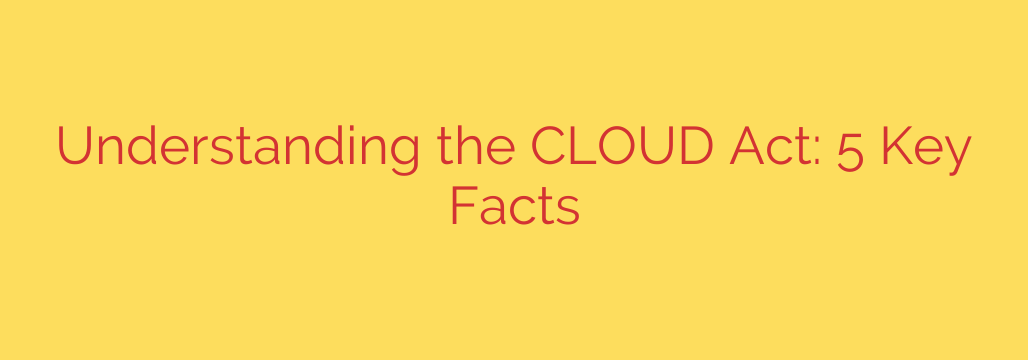
Is Your Data Safe in the Cloud? A Guide to the U.S. CLOUD Act
In today’s digital world, our personal and professional lives are intrinsically linked to the cloud. From family photos and private messages to sensitive corporate documents, we entrust U.S.-based tech giants like Google, Amazon, and Microsoft with our most valuable data. But what happens when a government demands access to that information, especially if it’s stored on a server halfway around the world?
This is the central question addressed by a significant and often misunderstood piece of U.S. legislation: the Clarifying Lawful Overseas Use of Data Act, better known as the CLOUD Act. Understanding its implications is crucial for anyone who uses cloud services.
What Exactly is the CLOUD Act?
Passed in 2018, the CLOUD Act empowers U.S. law enforcement agencies to compel U.S.-based technology providers to disclose requested data, regardless of where that data is physically stored in the world.
Before the CLOUD Act, a legal gray area existed. If U.S. law enforcement wanted data stored on a server in Ireland, for example, they often had to navigate complex and slow-moving international legal treaties. The CLOUD Act simplifies this process for U.S. authorities. It establishes that a U.S. company’s obligation to comply with a legal warrant is based on its jurisdiction (U.S.), not the location of its data.
Key Implications You Need to Understand
The act fundamentally changes the landscape of data privacy and has several critical consequences for both individuals and businesses.
Global Reach with U.S. Warrants
The most significant impact of the CLOUD Act is its extraterritorial reach. If a U.S. federal agency obtains a valid warrant or subpoena, a company like Apple or Google must turn over the requested data, even if it resides in a data center in Germany, Japan, or Brazil. The physical location of the server no longer provides a shield against U.S. legal requests. This applies to all forms of electronic communication, including emails, text messages, documents, and photos.Conflicts with International Privacy Laws
The CLOUD Act creates a direct legal conflict with other nations’ data privacy regulations, most notably the European Union’s General Data Protection Regulation (GDPR). The GDPR has strict rules about transferring personal data outside the EU. A U.S. company could find itself in a difficult position: comply with a U.S. warrant and potentially violate GDPR, or comply with GDPR and face legal penalties in the United States. This legal tightrope places the burden of navigating conflicting international laws squarely on the shoulders of tech companies.It Covers Content and Metadata
The act isn’t just about the content of your emails or documents. It also applies to non-content data, or metadata. This includes information like who you communicated with, when the communication occurred, your location, and for how long. Sometimes, this metadata can be just as revealing as the content itself.
Actionable Steps to Protect Your Data
While the CLOUD Act gives significant power to law enforcement, it doesn’t mean your data is completely exposed. There are proactive measures you can take to enhance your security and privacy.
- Implement Zero-Knowledge Encryption: The most effective defense is strong, end-to-end or zero-knowledge encryption. This means your cloud provider does not hold the encryption keys to your data. If data is encrypted before it’s uploaded and only you have the key, the company cannot comply with a request to turn over readable content. If a provider can’t decrypt your data, they can’t share it in a usable form.
- Know Your Provider’s Policies: Scrutinize the terms of service and privacy policies of your cloud provider. Understand where they are headquartered and how they respond to government data requests. Many major companies publish regular transparency reports detailing the number and type of government requests they receive.
- Understand Data Residency vs. Sovereignty: Choosing a cloud service that stores your data in your home country (data residency) is a good step, but the CLOUD Act proves it isn’t foolproof if the provider is U.S.-based. True data sovereignty means the data is subject only to the laws of the country where it is stored. This may involve choosing a provider headquartered outside of the United States.
- Practice Data Minimization: For businesses, a crucial strategy is to only collect and store data that is absolutely necessary for your operations. The less data you hold, the lower your risk profile. Regularly audit and delete data that is no longer needed.
The Bottom Line: Navigating a Complex Digital World
The CLOUD Act is a reality of our modern, interconnected world. It reflects the tension between law enforcement’s need to investigate crime and the individual’s right to privacy in a borderless digital age.
While you may not be able to change the law, you can change how you manage your data. By understanding the legal landscape and taking proactive security steps like implementing robust encryption and carefully vetting your service providers, you can better navigate the complexities of digital privacy and regain a significant measure of control over your information.
Source: https://aws.amazon.com/blogs/security/five-facts-about-how-the-cloud-act-actually-works/








